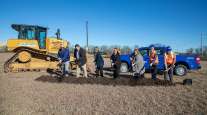Staff Reporter
Kansas Leaders Announce New Transportation Plan

[Stay on top of transportation news: Get TTNews in your inbox.]
Kansas Gov. Laura Kelly and Secretary of Transportation Julie Lorenz recently unveiled a new statewide transportation plan.
The pair announced the plan, called Forward, during an event at the State Capitol in Topeka on Feb. 12. Under Forward, highway modernization and expansion projects will be selected on a rolling basis every two years, rather than once a decade.
Additionally, Forward calls for the completion of delayed Transportation Works for Kansas projects and increased partnerships with local government agencies. Forward considers various aspects of transportation infrastructure, including transit, aviation, rail, bike and pedestrian needs. The plan also aims to direct more resources to expanding broadband in rural areas.
Today I joined @KDOTHQ Secretary Julie Lorenz to announce the details of FORWARD, our proposed statewide transportation plan. Under FORWARD, major projects will be selected every two years rather than once a decade - and all existing T-WORKS projects will be completed. #ksleg pic.twitter.com/AdTmtlonOX — Governor Laura Kelly (@GovLauraKelly) February 12, 2020
Lorenz said Forward will continue to provide resources to communities through the Cost Share Program and the Local Bridge Improvement Program, as well as safety initiatives. The Cost Share Program is meant to provide funding from various levels of government and private sector groups to support transportation projects. Through the Local Bridge Improvement Program, state funds are awarded to local public authorities to help reduce the number of deficient bridges.
“Most importantly, Forward will provide better service through helping communities solve more transportation problems by utilizing all of KDOT’s resources,” Lorenz said.
Kelly and Lorenz emphasized the need to quit transferring money out of the State Highway Fund. According to the Kansas Department of Transportation, more than $2 billion has been transferred out of the fund since 2011, which has resulted in a decline in the condition of the state highway system.
Since her election in November 2018, Kelly has tried to reverse the trend. She authorized $216 million in sales tax revenue to remain in the State Highway Fund in the state’s fiscal 2020 budget. This funding helped restore the bridge replacement program.
“To pass Forward, we must close the ‘Bank of KDOT’ and make sure that funding for transportation is spent on transportation,” Kelly said.
This past fall, KDOT hosted a series of meetings to allow members of the public to discuss transportation priorities and shape the plan. The agency will continue to hold meetings across the state every two years as a way to maintain transparency and accountability. Participants will be able to make KDOT officials aware of their transportation needs and evaluate the agency on how it’s performing.
“Kansans are ready to build a better transportation system for themselves and for future generations,” Lorenz said. “With Forward, KDOT will be ready to deliver.”
KDOT’s Cost Share Program and has been popular among local government agencies. In October, KDOT reported that it had received 92 applications for funding. In November, state leaders announced 22 projects had been selected as part of the program, representing nearly $74 million in state, local, federal and private investment.
The projects, which are located in all six of Kansas’ transportation districts, encompass a range of efforts to improve safety and mobility, relieve congestion, and support job retention.
They include intersection improvements at a juncture in Lansing, pavement patching along multiple roads in Allen County, highway bridge improvements in three neighboring southwestern Kansas counties and runway repairs at Salina Regional Airport.
Want more news? Listen to today's daily briefing:




